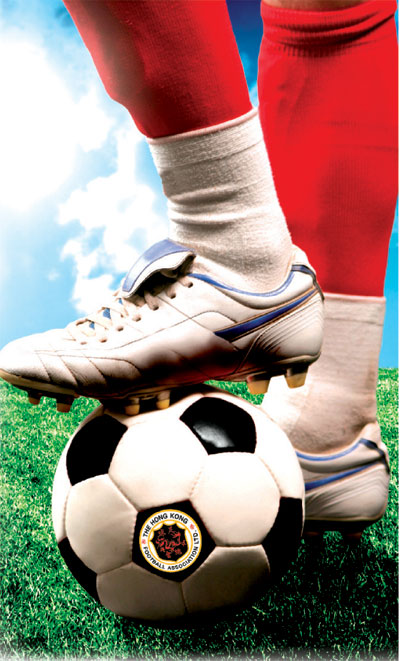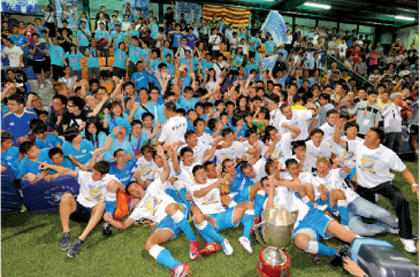Putting the bounce back in football
Updated: 2011-06-29 07:24
By Daniel Pordes(HK Edition)
|
|||||||

The sport of football, which once drew avid fan support in Hong Kong, is being pulled back from near extinction. But much remains to be accomplished - to clean up a sport that has been damaged by corruption in the past. Daniel Pordes reports.
When two 24-year-old football fans, Bosco Wong and Isaac Chan, began following a team in Hong Kong six years ago, they thought the club, with its young local players, had a future. Their loyalty was rewarded, Kitchee Sports Club won its first league championship in 47 years. On May 6, the team clinched the long-awaited title with an emphatic 7-2 thrashing of the already-relegated Hong Kong Football Club, scoring two more goals than even an optimistic Chan had predicted.
As the players hoisted the championship trophy in front of a packed stand filled with jubilant, flag-waving fans wearing the team's light blue colors, the beaming, bespectacled Wong jumped up and down with delight.
"This is unbelievable. This is the start of a new history."
It was hard not to be caught up in the post-match euphoria but reality bites hard, not far from the scenes of celebration. The packed stand at the Hong Kong Football Club is just that: one stand. The attendance of 1,263 that night, for one of the biggest games in 47 years for Kitchee, one of Hong Kong's top teams, meant the club could not fill even the modest 2,750 seat capacity. This low turn-out is by no means rare. Despite a few notable exceptions - the final of the East Asia Games and an AFC Cup Semifinal in 2009 - the last five years has seen average attendance peak at 1,548 in 2006-07, with the most recent figures showing an average of 710 fans for the 2009-10 season. For a population passionate about football, these are strikingly low numbers.
Support for football in Hong Kong used to be the envy of the continent: the first Asian Football Confederation Asian Cup was held in 1956 with Hong Kong placing a creditable third. The city followed up with a fourth place in 1964; from the 1950s to the 1980s the Hong Kong team was one of the highest ranked teams in Asia, and attendance averaged between 15,000 and 20,000 spectators.
Then came the decline. By the early 1990s, interest in local football in Hong Kong had dwindled. There came a significant drop in the number of spectators at matches. This had a knock-on effect in terms of money coming into the sport and the amount that could be paid to entice quality players into the game. And so the vicious cycle was created: lower attendance equalled less money in the game leading to poor quality football, leading to even lower attendance.
The reasons for the decline are varied. There was a lack of transparency to the Hong Kong Football Association (HKFA) board. There were allegations of illegal gambling and corruption as club owners oversaw multiple teams. Local people came into an era of greater choice among affordable forms of entertainment, including televised football matches from Europe. Another contributing factor was the decline in salaries and status of football players. Hong Kong football festered until a decision finally was made to try to save the game in Hong Kong.
Ten years ago Stephen Wong, partner at Tsang, Chan & Wong legal firm, was asked by the HKFA to join the disciplinary committee. After seven years he became legal adviser and began attending director's board meetings.
"I was asked to do things beyond the role of legal adviser," Wong explained during an interview in his offices in Central. "I ended up becoming engaged in a lot of tasks that involved both legal and policy issues."
In summer 2009 one of the committees Wong attended came up with the idea of creating a professional premier league in Hong Kong. It became the basis for "Project Phoenix", a full-blown effort aimed at revitalizing Hong Kong football. Wong thinks the initiative should have come 20 years ago earlier. The HKFA and then the Hong Kong Legislative Council agreed to bring in outside consultants. Wong spent over a year helping to select the right people. After many months of tendering and selection, Scot Wilson Ltd of Hong Kong was appointed as Change Agent in November 2010.
The paper produced by the Change Agent's findings contained several suggestions. Most important was a call for greater transparency of the HKFA's hierarchy. The consultant report also called for an expansion of the football association, and for a professional league. The measures were put to an extraordinary general meeting in April 2011 with all 84 representatives from 45 clubs voting yes to a string of constitutional changes. The results of this extraordinary general meeting marked the beginning of the most important period in the 97-year history of the HKFA.
Soon after the meeting, the government agreed to provide funds for senior management changes. A new Hong Kong team coach, a new chief executive officer and a senior director in charge of finance are currently being sought with the positions expected to be filled by September. Three "independent", or non-affiliated, directors will be invited onto to the board for the first time and membership in the association will now be open to interested parties with something to offer the game.
There also are new conditions prohibiting ownership of multiple clubs by single owners. The constitution has set it out explicitly.
There are some gray areas still, and Wong is doubtful about whether the new constitution will eradicate the problem. The stricter and more explicit original version that Wong wrote was rewritten for the final constitution, and even the "softer" article as it stands was only in because, as Wong puts it, "I had to stick my neck out".
Despite his misgivings, Wong remains confident this first step will help bring back Hong Kong football.
"With the right people coming in on the administrative side and board of directors, we can hopefully get the right kind of chemical reaction and get it going," he said. "I'm optimistic, I believe it will work - but it will not be easy."
Along with setting up an independent self-governing premier league system for the 2012-13 season that will promote development, increase funding and investment, the project also suggests ultimately sending a Hong Kong team into mainland's Super League, a goal that is confirmed by Wong.
These moves to bring football back to life have become a source of some dismay in Hong Kong's football circles. On the other hand, potential investors internationally are more likely to be attracted by the rule changes. Asia Pacific Associate Director of sports public relation agency brand Rapport Damien McDowell believes the controversial move will be welcomed by foreign companies, ever eager to break into the mainland market.
"From a commercial point of view this would be a very sensible approach," McDowell said. "Having access to the mainland footballing community would certainly be attractive to sponsors and get them interested in investing in Hong Kong football."
Another Hong Kong-based sports marketing executive went as far as to say Hong Kong football "would die unless it became integrated into mainland's football league".
Needless to say, these views are not held very highly by domestic clubs. "Yes, teams that join the mainland league will get more publicity but what about the local teams that provide the representative side their players?" Chan Hiu-ming, head coach of Hong Kong 1st Division team TSW Pegasus, said. "It might bring in more fans and money, but it won't save Hong Kong's representative team or promote football development."
The other problem with entry into mainland's football scene would be the taint of corruption that the HKFA has specifically been trying to avoid with its reforms. Acting president of the AFC Zhang Jilong has recently publicly acknowledged the problems the mainland leagues face with match-fixing and illegal gambling.
In general, McDowell believes the project to be a positive step forward and proposes that combining the legacy of the past with modern administration could create a positive future for the game.
"It's a unique heritage sport. Look at Kitchee, and South China AA," he said. "Combining the rich history of football here with independent, transparent management with a good background in business will mean those commercial opportunities will come in full course. Especially once they pass the requirements for the (AFC) Champions League."
However this will not happen overnight, and McDowell concedes there is still a long way to go before international companies will see Hong Kong's domestic football scene as an attractive investment.
"The fact of the matter is that a major sponsor's first question will always be: 'How many people come to the games and what kind of TV exposure is there?'"
While financing from large businesses may not be immediate, two large investments will come to fruition this year, and the decision for a third could be taken by the end of this year. Last month the government announced that three teams, Wofoo Tai Po, Tuen Mun and newly promoted Sham Shui Po, will each receive HK$500,000 for the new league season. This is a clear first step from the government to show they have made a conscious decision to promote football and be more involved in the development of the game. The three teams in question are district-based and it is hoped the teams will provide a catalyst for the local inhabitants to foster a community around, creating a regional identity so prevalent in more developed footballing regions.
The second long-awaited event will be the re-opening of the Mongkok Stadium scheduled for October 2011 after two years of renovations. The HK$275 million upgrade will see the ground that once hosted the majority of football fixtures become the home of three teams: Citizen, Fourway Rangers and Sun Hei. In a city where land is at a premium, this newly refurbished stadium can be crucial for attracting crowds once more.
The final piece of infrastructure waiting to be implemented is a football training center in Tseung Kwan O. The proposed academy of excellence can be crucial for the development of future football talent in Hong Kong. The government has invited the Hong Kong Jockey Club to provide funding to build the center, but the jockey club haven't yet agreed - saying the club awaits the completion of the proposed Project Phoenix changes.
In an emailed statement the jockey club said: "Before the club makes the final determination on the support for the proposed football training center, it is also essential to see that the changes recommended in the report for enhancing football development in Hong Kong have been successfully implemented."
This decision made over this summer will not only determine whether we see a wide-sweeping reforms of the HKFA leadership, a Hong Kong Premier League in 2012, or a new training academy in Tseung Kwan O.
It determines the path of Hong Kong football - doomed to stagnate into insignificance, or fulfil the dreams of Bosco and Isaac and start a new history.

(HK Edition 06/29/2011 page4)